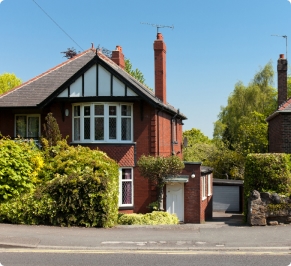The stats are clear: nearly half of UK doctors have experienced burnout and stress during COVID-19. Still, you’ve stayed on the frontline. You’ve shown great resilience and dedication to save lives and care for patients.
Now, it’s time to focus on something just as important: getting the best mortgage for your dream home. You deserve a smooth, stress-free process, and the best deal to finance your home.
Do Doctors Get Better Mortgage Deals?
Yes, doctors often get better mortgage deals than other borrowers. This is because you are in high demand and have a very low risk of unemployment in the UK.

As a doctor, there are no special mortgages for you. You can get a standard mortgage like everyone else. But because of your profession, you’re in a good position to get a good deal.
Lenders look for stability, so they are more likely to offer you flexible underwriting and better terms. Your dedication to completing years of study to get qualified is seen as a sign of reliability.
However, even doctors can have trouble getting a mortgage. So here we’ve noted four reasons why you might struggle to get a mortgage, and what you can do to improve your chances.
7 Ways to Increase Your Chances to Get the Best Mortgage Deal
In addition to your career and qualification with the General Medical Council (GMC), it’s important to get your finances in order.
Lenders will look at your income, expenses, and credit history to assess your creditworthiness, which is crucial for your mortgage application.
Here are a few things you can do to improve your chances of getting the best mortgage deal: [Image: Checklist]
- Get on the electoral roll. To show lenders that you’re a settled member of the community.
- Pay your bills on time. So lenders see that you’re reliable and trustworthy.
- Check your credit report for mistakes. Anything from a wrong address to a missed payment, always check it before your lenders do.
- Look for any fraudulent activity. If someone has opened a credit card in your name, it could damage your credit score.
- Make sure you’re not linked to anyone else. This is someone you’ve had a joint account or shared financial obligations with. If they have bad credit or have moved abroad, it might be best to cut financial ties with them.
- Keep your debt levels low. The more debt you have, the less likely you are to be approved for a mortgage.
- Be prepared to negotiate. Don’t be afraid to negotiate with the lender to get a better deal. You may be able to get a lower interest rate, a longer repayment period, or a lower monthly payment.
How much can Doctors Borrow?
As a low-risk borrower, you can borrow up to 6 times your annual salary. This is especially true for experienced doctors with high earnings. But this might be lower for junior doctors.
Lenders will usually offer mortgages of up to 4 or 5.5 times your annual salary. To get an idea of the potential amount you can borrow, have look at the table below: [Image]
| Role | *Annual Salary | 4 times | 5 times | 6 times |
| Foundation Training | £34,012 | £136,048 | £170,060 | £204,072 |
| Specialist Grade Doctor | £91,584 | £366,336 | £457,920 | £549,504 |
| General Practitioners | £98,194 | £392,776 | £490,970 | £589,164 |
| Consultants | £119,133 | £476,532 | £595,665 | £714,798 |
Note though, that the exact amount you can borrow will depend on your circumstances, including your affordability assessment, deposit size, and credit history.
Test Quote Section
With this, you can secure the loan against the commericla property itself. This means you don’t have to mix up your personal and business finances – they stay separate and organised.
Source and Citation for quote section above
Commercial Mortgages for Doctor
A commercial mortgage can be a good option if you’re a doctor looking to buy or expand your own practice. It’s a loan specifically designed for commercial purposes, such as buying or renovating a medical practice.
[Image: An image of a doctor in a commercial office setting, maybe in their own practice. Alt tag: “Doctor in their commercial medical practice]
With this, you can secure the loan against the commericla property itself. This means you don’t have to mix up your personal and business finances – they stay separate and organised.
Generally, medical practices are seen a low-risk investments. But lenders will still assess if you’re practice is profitable, and you’re financially stable. They’ll check on many factors including:
- Your credit score
- Your income and deposit size
- Proof of qualification and doctor’s experience
- The amount of the loan
- The term of the loan
- The value of the property
If you’re thinking of getting a commercial mortgage, it’s best to consult with a financial advisor to see what your options are and if you’re eligible.
The Bottom Line – CONCLUSION SECTION
There you have it. Mortgages for doctors are easier to get than you might think. In fact, with a bit of planning and preparation, you can buy your dream home, even if you’re still in training.
As low-risk borrowers, lenders are often willing to offer you good rates and terms. To get the best deal, make sure your income, credit score, and employment history are all in order. A large deposit can also help you get a better deal.
There’s a lot of great options on the market. But you need a good mortgage broker to find them. They’ll be your personal shopper for mortgages as they know the market inside out. They can also help you find the perfect deal for your needs and budget.
If you’re taking the next step towards homeownership – don’t hesitate to reach out to us. We’ll connect you with a qualified mortgage broker who specialises in mortgages for doctors.
CTA SECTION SHOULD GO HERE
Mortgages for Doctors – FAQs: – SHOULD BE ACCORDIONS
Can doctors get special mortgage rates in the UK?
Generally, yes. Especially, if you’re a senior doctor with high earnings. Lenders usually will offer you lower interest rates and more flexible terms than they do to other borrowers.
What mortgage options are available to doctors in the UK?
The best type of mortgage for you depends on your circumstances and needs. But, in general, here are some types of mortgages available to doctors in the UK:
- Repayment mortgages are the most common type of mortgage. With this, you pay back both the interest and part of the loan each month. This can be the best way to build equity in your home over time.
- Interest-only mortgages are a type of mortgage where you only pay back the interest on the loan each month. The principal is not repaid until the end of the mortgage term. This type can be risky, as you could end up owing more money than the value of your home.
- Fixed-rate mortgages have an interest rate that stays the same for a set period, usually 2 or 10 years. It gives you peace of mind, as you know how much your monthly payments will be for the duration of the fixed rate period.
- Variable-rate mortgages have an interest rate that can go up or down over time. So your monthly payments may also go up or down. It can be a good option if you think interest rates are going to fall, but there’s still uncertainty involved as they could go up.
As a doctor, you may be able to get a mortgage with a lower interest rate than someone in another profession. If you’re a first-time buyer, read this guide to make informed decisions when you buy your first home.








